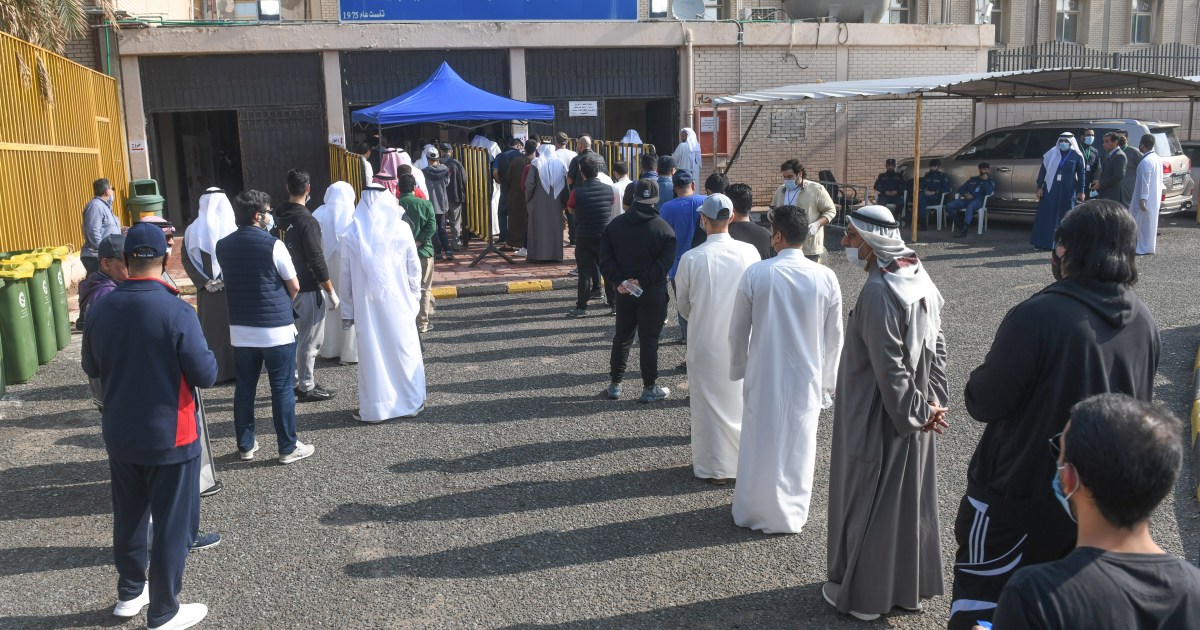Kuwait / private
Tens of thousands of Kuwaiti citizens flocked since the early morning hours to the polls today to cast their votes in the 16th legislative term elections.
The number of candidates competing in the current elections decreased after the waiver door closed a few days ago, to 326, including 29 women out of 395 candidates, including 33 women who registered their names with the opening of candidacy early last month.
Figures and Statistics
Candidates are competing for 50 seats representing the total seats in the Kuwaiti National Assembly, whose members are chosen by direct secret ballot, while the total number of voters in the five constituencies is about 567 thousand, including 273.9 thousand voters, and 293.7 thousand female voters distributed among 590 committees according to the latest statistics of the Ministry of Interior .
Al-Jazeera Net correspondent monitored a great turnout in the various polling committees of both men and women despite the rain, while the Kuwaiti authorities imposed strict measures due to the repercussions of the Corona virus, including wearing masks and hand gloves, adhering to sterilization operations and measuring temperature at the entrance to the polling stations.
The Ministry of Interior has allocated 5 main committees for Corona victims to cast their votes in isolation from the rest of the electorate, according to a committee in each of the five constituencies.
The Kuwaiti opposition hopes to increase its seats in the current elections in which it participates strongly compared to the last elections that took place in 2016, which represented its first participation after the boycott of the 2012 and 2013 councils, which were elected according to the one-vote decree issued in 2012 under the decree of necessity.
The head of the Kuwaiti Transparency Society (a non-governmental public benefit association) Majid Al-Mutairi praised the measures taken by the authorities to organize the electoral process, noting that the health measures taken contributed to an increase in the participation rate because they spread the spirit of reassurance to citizens, according to what was quoted by the local news agency KUNA.
International observers from several countries hosted by the Kuwaiti Transparency Society, in addition to a number of NGOs and the Public Authority for Combating Corruption (a government agency), which organized a training course for dozens of volunteers in monitoring elections during the last period, participate in the electoral process.
High turnout
Observers said to Al-Jazeera Net that, until this evening, the voting rate reached more than 50% of the total number of voters, about 3 hours before the voting closed at eight in the evening, while the participation of men was noticed at a large percentage compared to the presence of women in the current elections.
Electoral analyst Abdul Razzaq Al-Shayji said that political organizations that can mobilize their bases and supporters such as the Islamic Constitutional Movement, the Salafist movement, some Shiite organizations, as well as the tribes (...) have a greater chance to improve their seats in the current elections.
Al-Shayji added - in a statement to Al-Jazeera Net - that the opposition’s increase in its share in Parliament is linked to the high level of participation from the level it reached in the last elections (66.8%).
Expected change
He pointed out that the current parliament is expected to witness a general change rate of no less than 50%, in view of several factors, the most prominent of which is the reluctance of 7 former MPs to run in a first of its kind, and what he described as a state of popular discontent with the performance of the previous council, as well as we are facing A new government did not want to interfere in the current elections and has largely moved away from the calculation of supporting candidates.
The candidate of the Islamic Constitutional Movement (Hadas) (the political wing of the Muslim Brotherhood in Kuwait) Osama Al-Shaheen said that the attendance in today's elections came contrary to the expectations of analysts and study centers, as it is clear that the current elections had a large popular presence, which was translated into the waiting queues outside many committees.

